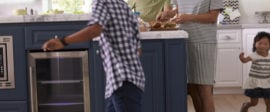4 Bible Lessons to Teach Kids Work Ethic
Article / Produced by TOW Project
The work of raising children is not easy. The Bible acknowledges this difficult reality in Proverbs 22:15. “Folly is bound up in the heart of a child.” This is no surprise to any parent who has yelled things like, “Cleaning your room means NOW” or “Don’t use the cat as a feather duster!”
The Bible offers parents the promise that wisdom can eventually replace folly in a child's heart. "Train children in the right way, and when old, they will not stray" (Proverbs 22:6).
Parents can use these 4 Bible lessons to teach kids about work ethic. They come from the book Kids CAN! 28-Day Family Devotional, Upholding the Biblical Value of Work.
1) Genesis 2:15—Everyone Has Work to Do
The Lord God took the man and put him in the garden of Eden to till it and keep it.
Everyone—toddlers, kids, and grownups—is made to work. Everyone wants meaningful work to do. God designed people this way.
When God made the first person, God gave him a job. Genesis 2:15 says that God put Adam in the garden “to tend and watch over it.” God also gave Adam the job of naming all the animals. God created them, and Adam named them. They worked as partners.
A home is a place for partnership, too. Your family is a team and God put your family together for a reason.
Parents and kids, try this: Name one thing you do at home that makes you feel proud of yourself. It could be a skill like cooking a tasty meal, or it could be something you do for the sake of the household, like raking leaves or washing dishes. Whatever job makes you feel proud, say, “God created me to __________. When I __________, I’m helping my family team, and I’m partnering with God.”
Prayer: God, thank you for making me the way I am. Help me see the importance of the work I do at home today. Help me see the work of those around me today. In Jesus’ name, amen.
2) 1 Corinthians 12:12—Families Work Together
Just as the body is one and has many members, and all the members of the body, though many, are one body, so it is with Christ.
You might feel like you get stuck with the worst chores because you’re younger than other people in your family or because you don’t know how to make elaborate meals. But your family still needs you. There’s something you can do to help. Everyone has a different part in your family, just like your body had many different parts. If you want to do a cartwheel, all the parts of your body need to work together. If you want things to work right at your house, all the parts of your family have to work together too.
Parents and kids, try this: Name three things that someone else in your family does for you.
Prayer: God, help my family work together as different parts of one body. In Jesus’ name, amen.
3) Ecclesiastes 4:9-12—Chores Bring Us Together
Two are better than one, because they have a good reward for their toil… A three-fold cord is not quickly broken.
Chores show the people you live with that you care about them. You may not like doing them, but you’ll like the results that come from your work: happy parents, proud kids, a clean place to live, and a family who likes being together.
The writer of Ecclesiastes encouraged people to work together for better results. Three people can clean a house better than one person alone. It’s also better for the relationships within your family. When you work together you value others and fight less.
Parents and kids, try this: Think about the non-financial rewards for the work you do in the house. These could be:
- Relaxing in a clean home
- Enjoying a nice meal as a family
- Feeling pride at doing a job well
- Feeling the joy of being helpful
As a family, take turns naming the chores you do, and come up with at least one non-financial reward you get from doing each chore.
Prayer: God, help me love my family through my work today. In Jesus’ name, amen.
4) Luke 16:10—Work Ethic Means Being Dependable
Whoever is faithful in a very little is faithful also in much; and whoever is dishonest in a very little is dishonest also in much.
Dependability means being reliable, trustworthy, doing what you said you would do. Small actions demonstrate this—it doesn’t need to be big stuff. Something as simple as showing up on time and bringing a pencil to take notes shows that you’re dependable. People who see you acting dependable in small ways will trust you with bigger responsibilities.
Parents and kids, try this: Think of the most dependable person you know. If you can, interview that person. What are their daily work habits? What makes them dependable?
Prayer: God, I have faith that you can do all things. Help me be a person other people can depend on. In Jesus’ name, amen.
Exercise to teach kids work ethic:
Make a chore web like the mother and daughter in this story
From Kids CAN! 28-Day Family Devotional, Upholding the Biblical Value of Work
“We fought a lot about chores today,” Alaysha’s mother said. “Let’s write down a plan to do better.”
Alaysha groaned. “Is this another chore chart?”
“No, it’s more like a web,” her mother said, taking a piece of paper and writing the name of a family member in each corner.
“Here are the people who live in this house. And here are tomorrow’s chores,” she said, making a list down the center of the page. The list included cook breakfast, fold laundry, and other chores. “We could think of these as things we have to do, but I see them as things we do because we love each other.”
Mom drew a line from her name to cook breakfast. “When I make breakfast, I’m helping you start your day with energy.” She continued the line to Alaysha’s name. “That makes you happy. And it shows I love you.”
She drew a line from Alaysha’s name to fold laundry to Mom’s name. “When you put away the clothes, I know that everything is ready when I need it. That makes me feel loved.”
She drew more lines connecting the members of her family to their chores and to the people who benefit from them. “We’ve each got many different ways to show that we love each other.”
“OK.” Alaysha said. “I get it. Can I keep the picture? I want to remember how to love you next time.”
Parents and kids, try this: On a blank sheet of paper, draw your own family chore web and post it somewhere you can all see.











